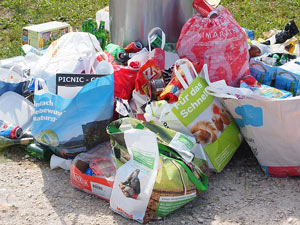Solid Waste on College Campuses - A SWANA Scholarship Application Essay
August 24, 2022 by Joe Buono
As a way of recognizing some of the outstanding scholarship applications nominated to SWANA by our Chapters across the United States and Canada, we are posting applicants’ one-page essays on our blog. The essay, which was 10 percent of their application score, was to speak to the role solid waste management plays in addressing an environmental issue currently in the news. We asked, “What are the responsibilities of individuals who generate the waste versus the professionals tasked with managing the waste?”
The following essay was submitted by Joe Buono, one of the recipients of a 2022 Category I SWANA scholarship.

In the United States there is an epidemic. This epidemic is a combination of lack of knowledge and awareness. Recycling on college campuses has become a major issue, but many people do not realize the truth of it. Whether there is garbage in the recycling bins or recycling in the garbage, the combination is truly detrimental to the mitigation of solid waste. The big question of this matter is, who is truly responsible for these problems? During the spring of 2019, I went on a journey with the Environmental Service Management Group to discover the root of these issues.
Over the course of a few days, we traveled to a major ivy league university to partake in a waste audit in order to assess the waste habits of the college. In the heat, we sorted through their trash and recycling, picking out the problems and recording them until we began to notice some patterns. A lot of the solid waste that was going through their campus was from food take-out containers that could not be recycled. This pointed to the idea that local restaurants are a huge contributor to the troubles of solid waste at the university. However, with this source of the problem found, it is much easier to fight. These restaurants could switch to a different type of plastic container that can actually be recycled. That way, the recycling on these campuses would not be contaminated with non-recyclable plastic. On the other end of this subject, a lot of contamination in the waste stream came from students either carelessly or unknowingly putting the wrong type of waste in a container. On the consumer side of this, the students need to be much more careful about what they are putting in their garbage and recycling. Overall, while the source of these issues can be traced back to businesses and local restaurants, nothing will change if the students do not change their habits as well.
After making its way into the recycling or garbage, the waste is then in the hands of the workers who manage it. Even though they are not the ones contaminating the waste stream, they have a responsibility to try to fix it. As we had discovered, there was a lot of garbage in recycling bins and vice versa. While it can oftentimes be hard to fix this contamination issue, there are a number of measures that can be taken in order to manage it as best as possible. One solution is to make sure that the difference between the recycling and garbage bins is very clear. That way, the large-scale contamination could be somewhat reduced. In addition, a better sorting system for the different types of recycling on campus could be another way to improve these issues. This would help on a smaller scale, but prevent students from putting the wrong types of waste into the recycling. In conjunction with that idea, the waste professionals at colleges are responsible for educating the community on what should and should not be recycled. They could host mandatory assemblies in which they educate staff and students on the different types of plastics and the importance of putting them in the right bin. Putting up signs all over the campus, especially in high traffic areas such as dining halls, that differentiate the different plastics could be another helpful solution. This method could help members of the college be reminded about what they should or should not be recycling as they are doing so. Overall, a common theme within all of this is that the professionals have a responsibility to try to help solve these issues whether it be on a smaller or grander scale.
All in all, the waste habits of universities all around the country have become a serious problem. They are contaminating the waste stream whether it be as a result of carelessness or simply a lack of knowledge. Through my time participating in the waste audit at a major ivy league university, I had a first hand account of the true scale of this issue. Keeping solid waste in check is a task that can not be achieved by one person alone. It is the responsibility of the waste producers and managers to fix these issues one day at a time to the best of their ability.
Learn more about our scholarship winners in our recent newsletter article.







Leave a comment